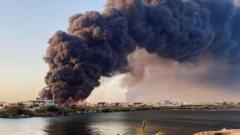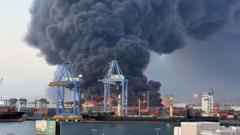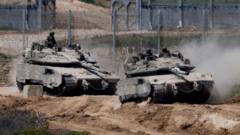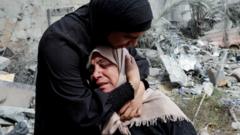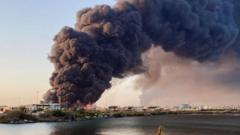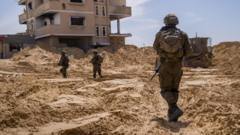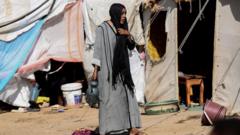In a shocking escalation of violence, Port Sudan, once deemed a refuge from Sudan’s brutal civil war, has fallen victim to a week of relentless attacks from the Rapid Support Forces (RSF) paramilitary group. The city is now experiencing critical shortages of water and power, drastically affecting daily life as chaos unfolds.
No Water, No Power: Port Sudan Faces Crisis After Attacks
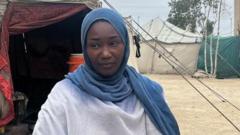
No Water, No Power: Port Sudan Faces Crisis After Attacks
Port Sudan grapples with soaring water prices and blackouts following recent drone strikes, revealing the dire humanitarian impact of ongoing conflict.
Over the past week, Port Sudan has been blanketed in thick black smoke from fuel depots targeted by aerial bombardments. Rescue teams are struggling with ongoing fires, further hampering the retrieval of essential resources. This conflict, which ignited more than two years ago amid a power struggle between the RSF and the Sudanese army, has led to one of the world’s direst humanitarian crises, displacing over 12 million individuals across the country.
Inside Port Sudan, residents like 26-year-old Mutasim are feeling the brunt of the situation. He explained how, just a week ago, he could buy a day’s supply of water for 2,000 Sudanese pounds (around $3.30); that price, however, has now skyrocketed to ten thousand pounds due to scarcity. The recent damage to fuel supplies has left the city without diesel, halting the operations of water pumps needed to extract groundwater.
Life in Port Sudan, which once offered safety and normalcy, is rapidly changing. Streets swarm with frustrated locals waiting hours at gas stations just to fill their vehicles. Mutasim shared how dangerous the atmosphere has become, with many considering leaving but finding it financially implausible. "We were thinking about moving because it is no longer safe here, but it’s so expensive - and where do we go?" he lamented.
The energy situation is similarly grim, with Port Sudan experiencing severe power outages that have intensified over the past two weeks. Residents are deprived of essential electricity to cope with the sweltering heat, leaving families in discomfort and darkness. For those with elderly relatives, like Mutasim’s 70-year-old aunt, the absence of power for fans worsens an already dire situation as sleepless nights ensue.
Invading drones have returned terror to the city's many displaced residents, such as Hawa Mustafa, who fled Darfur with her children. Living without a husband, Hawa describes the latest attacks as a return to a state of war. "The sounds of the drones and the anti-aircraft missiles remind me of the first days of the war in el-Geneina," she said with evident distress.
Humans affected by the conflict continue to face uncertainty. Mariam Atta, another resident in despair, remarked that "life has changed completely," articulating the constant fear residents now navigate in their daily lives.
Concern mounts within humanitarian organizations that these ongoing attacks on Port Sudan may obstruct the flow of life-saving aid. Leni Kinzli, a spokesperson for the World Food Programme (WFP), reaffirmed the critical role Port Sudan plays in delivering food assistance, as it remains the last vital humanitarian hub amidst worsening famine conditions across the country.
With 10 regions already facing famine, and 17 more on the precipice, the implications of this conflict reach far beyond the immediate destruction. The city, once a rallying point for aid distribution, hangs in vulnerability as disaster looms closer.
As night falls across Port Sudan, darkness envelops the city, where bustling gatherings have now fallen silent, replaced by the somber reality of hidden fears, disrupted lives, and the delicate hope for better days.
Inside Port Sudan, residents like 26-year-old Mutasim are feeling the brunt of the situation. He explained how, just a week ago, he could buy a day’s supply of water for 2,000 Sudanese pounds (around $3.30); that price, however, has now skyrocketed to ten thousand pounds due to scarcity. The recent damage to fuel supplies has left the city without diesel, halting the operations of water pumps needed to extract groundwater.
Life in Port Sudan, which once offered safety and normalcy, is rapidly changing. Streets swarm with frustrated locals waiting hours at gas stations just to fill their vehicles. Mutasim shared how dangerous the atmosphere has become, with many considering leaving but finding it financially implausible. "We were thinking about moving because it is no longer safe here, but it’s so expensive - and where do we go?" he lamented.
The energy situation is similarly grim, with Port Sudan experiencing severe power outages that have intensified over the past two weeks. Residents are deprived of essential electricity to cope with the sweltering heat, leaving families in discomfort and darkness. For those with elderly relatives, like Mutasim’s 70-year-old aunt, the absence of power for fans worsens an already dire situation as sleepless nights ensue.
Invading drones have returned terror to the city's many displaced residents, such as Hawa Mustafa, who fled Darfur with her children. Living without a husband, Hawa describes the latest attacks as a return to a state of war. "The sounds of the drones and the anti-aircraft missiles remind me of the first days of the war in el-Geneina," she said with evident distress.
Humans affected by the conflict continue to face uncertainty. Mariam Atta, another resident in despair, remarked that "life has changed completely," articulating the constant fear residents now navigate in their daily lives.
Concern mounts within humanitarian organizations that these ongoing attacks on Port Sudan may obstruct the flow of life-saving aid. Leni Kinzli, a spokesperson for the World Food Programme (WFP), reaffirmed the critical role Port Sudan plays in delivering food assistance, as it remains the last vital humanitarian hub amidst worsening famine conditions across the country.
With 10 regions already facing famine, and 17 more on the precipice, the implications of this conflict reach far beyond the immediate destruction. The city, once a rallying point for aid distribution, hangs in vulnerability as disaster looms closer.
As night falls across Port Sudan, darkness envelops the city, where bustling gatherings have now fallen silent, replaced by the somber reality of hidden fears, disrupted lives, and the delicate hope for better days.






